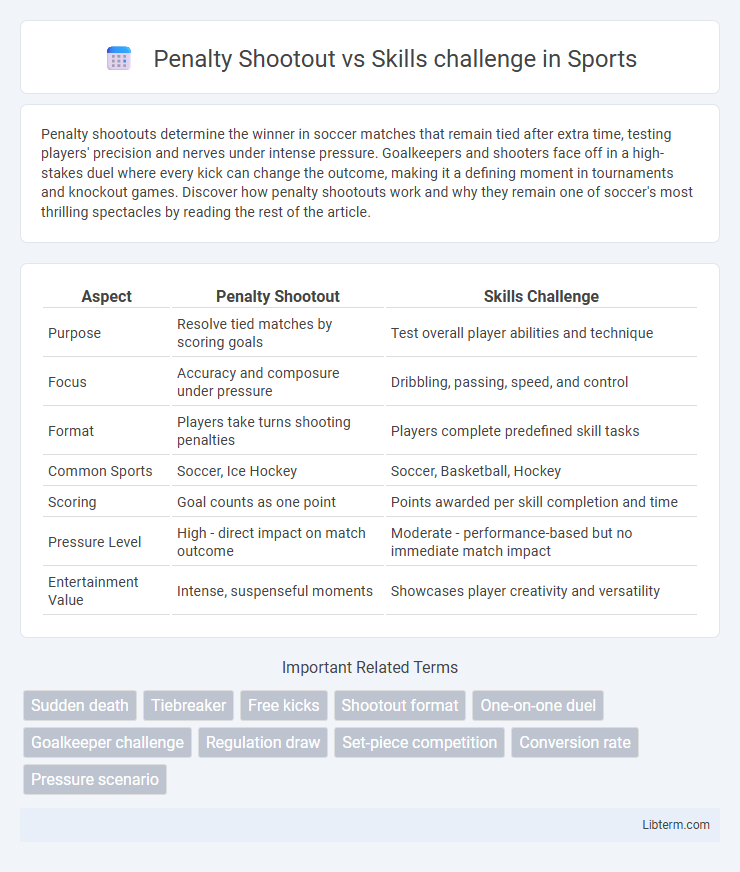Penalty shootouts determine the winner in soccer matches that remain tied after extra time, testing players' precision and nerves under intense pressure. Goalkeepers and shooters face off in a high-stakes duel where every kick can change the outcome, making it a defining moment in tournaments and knockout games. Discover how penalty shootouts work and why they remain one of soccer's most thrilling spectacles by reading the rest of the article.
Table of Comparison
| Aspect | Penalty Shootout | Skills Challenge |
|---|---|---|
| Purpose | Resolve tied matches by scoring goals | Test overall player abilities and technique |
| Focus | Accuracy and composure under pressure | Dribbling, passing, speed, and control |
| Format | Players take turns shooting penalties | Players complete predefined skill tasks |
| Common Sports | Soccer, Ice Hockey | Soccer, Basketball, Hockey |
| Scoring | Goal counts as one point | Points awarded per skill completion and time |
| Pressure Level | High - direct impact on match outcome | Moderate - performance-based but no immediate match impact |
| Entertainment Value | Intense, suspenseful moments | Showcases player creativity and versatility |
Introduction to Penalty Shootouts and Skills Challenges
Penalty shootouts are decisive methods used in soccer to resolve tied matches by having players take turns attempting to score from the penalty spot against the opposing goalkeeper. Skills challenges test a player's technical abilities, such as dribbling, passing accuracy, and ball control, through timed or scored drills that simulate game scenarios. Both formats evaluate different aspects of a player's performance, with penalty shootouts emphasizing composure under pressure and skills challenges focusing on technical proficiency.
Key Differences Between Penalty Shootouts and Skills Challenges
Penalty shootouts primarily test a player's composure and accuracy under intense pressure by requiring them to score goals from a fixed spot against a goalkeeper. Skills challenges emphasize a broader range of technical abilities such as dribbling, passing, and ball control through various obstacle courses or timed tasks. The key difference lies in penalty shootouts focusing on goal-scoring precision and mental resilience, whereas skills challenges assess overall technical proficiency and agility.
Historical Origins of Both Formats
Penalty shootouts originated in the early 1970s as a decisive method to resolve tied football matches, first notably used in the 1976 European Championship. Skills challenges have roots in earlier sports traditions, emphasizing individual player technique and creativity long before organized competitions, with formalized contests evolving in various sports during the late 20th century. The contrasting origins reflect penalty shootouts as structured conflict resolution mechanisms, whereas skills challenges celebrate individual mastery and entertainment value.
The Role of Pressure and Nerves
Penalty shootouts magnify the influence of pressure and nerves, as players face high-stakes moments where a single mistake can decide the outcome of a match. Skills challenges, while testing technical ability, typically occur in lower-pressure environments, allowing participants to perform with less psychological strain. The intense atmosphere in penalty shootouts triggers adrenaline and anxiety, which can impair decision-making and execution, highlighting the crucial role of mental resilience in such scenarios.
Skillsets Required for Success
Penalty shootouts demand precision, composure, and the ability to perform under intense pressure, emphasizing accuracy and mental resilience. Skills challenges prioritize technical prowess, agility, dribbling, and creativity to navigate obstacles and execute complex maneuvers. Mastery in penalty shootouts hinges on focused shooting and psychological strength, whereas skills challenges require versatile ball control and quick decision-making.
Impact on Team Strategy and Preparation
Penalty shootouts significantly influence team strategy by emphasizing goalkeeper preparation and individual player composure, often leading coaches to prioritize penalty takers during training sessions. Skills challenges, by contrast, enhance overall technical abilities such as dribbling, passing accuracy, and agility, promoting a more versatile playing style and fostering creative tactics on the field. Integrating both approaches can balance focused high-pressure scenarios with skill development, ultimately strengthening team adaptability and performance under various match conditions.
Spectator Engagement and Entertainment Value
Penalty shootouts captivate spectators with high-stakes drama and sudden-death tension, driving intense emotional investment in each kick's outcome. Skills challenges showcase player agility and technical mastery, offering continuous, dynamic displays that engage fans through variety and spectacle. Both formats enhance entertainment value by blending competition with crowd interaction, but penalty shootouts deliver peak suspense, while skills challenges maintain sustained excitement.
Controversies and Criticisms
Penalty shootouts face criticism for relying heavily on luck rather than overall team performance, often undermining the skill and strategy demonstrated throughout a match. Skills challenges, while showcasing individual talent, are sometimes viewed as lacking the high-stakes pressure and unpredictability that define traditional gameplay outcomes. Both formats generate controversy for potentially distorting the fair assessment of team capabilities and the essence of competitive football.
Notable Moments in Sports History
The penalty shootout has produced iconic sports moments such as Roberto Baggio's 1994 World Cup miss, redefining soccer's dramatic tension. Skills challenges highlight individual athletic prowess, with NBA All-Star Weekend showcasing legendary feats like Kobe Bryant's 1997 Slam Dunk Contest performance. Both formats create unforgettable highlights that capture fans' emotions and celebrate extraordinary talent in competitive sports.
Future Evolution and Development
Penalty shootouts will evolve with advanced sensor technology and AI analytics, enhancing decision-making accuracy and player performance assessment in real-time. Skills challenges are expected to integrate virtual reality and gamification, promoting immersive training environments that simulate match scenarios for improved precision and agility. Both formats will increasingly leverage data-driven insights to elevate competition standards and viewer engagement in future football events.
Penalty Shootout Infographic

 libterm.com
libterm.com